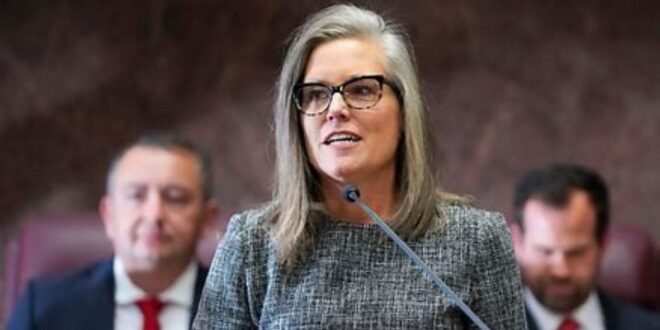In a controversial move, Arizona Governor Katie Hobbs has vetoed a proposed bill that would have made Bitcoin a legal form of tender within the state, sparking outrage from local crypto advocates and the broader blockchain community. The veto has ignited a fierce debate over the role of cryptocurrencies in state economies and the future of digital asset legislation in the U.S.
The Bitcoin Bill That Could Have Changed Arizona
The bill, known as SB 1231, aimed to allow businesses in Arizona to accept Bitcoin as an official form of payment. Introduced by state legislators with strong support from the local crypto industry, the bill was seen as a way to position Arizona as a national leader in digital finance. Proponents argued that the move would attract cryptocurrency firms, foster innovation, and provide financial inclusion to underserved communities.
However, after receiving the bill, Governor Hobbs issued a veto, citing concerns about the volatility of Bitcoin and its potential to disrupt Arizona’s economy. In a statement, Hobbs explained that while she supports blockchain technology, Bitcoin’s price fluctuations could create instability for businesses and consumers alike, making it unsuitable as an official currency.
Strong Reactions from the Crypto Community
The veto has caused an uproar among Arizona’s growing crypto community, which had rallied behind the bill as a step forward for financial innovation. Crypto advocates argue that the governor’s decision is a missed opportunity to capitalize on the burgeoning digital asset economy.
Several prominent figures in the cryptocurrency space have expressed their frustration with Hobbs’ decision. Tyler Winklevoss, co-founder of the Gemini exchange, tweeted, “This is a step backward for Arizona, which had the chance to become a hub for crypto innovation. Blockchain technology should be embraced, not feared.”
Local activists and business owners have also voiced their disappointment, stressing that the bill would have attracted investment and positioned Arizona as a forward-thinking state in the digital finance world. Several business owners who were preparing to accept Bitcoin payments have now called on the governor to reconsider her stance.
Political and Economic Implications
The veto has not only generated anger among crypto enthusiasts but also raised questions about the future of cryptocurrency legislation in the U.S. Arizona was one of several states looking to explore the possibility of embracing Bitcoin as legal tender, following in the footsteps of El Salvador, which adopted Bitcoin as a national currency in 2021. However, Hobbs’ veto signals a more cautious approach from U.S. lawmakers, who continue to wrestle with how to regulate digital assets.
Governor Hobbs’ decision could have broader political implications, as it underscores the challenges faced by cryptocurrency proponents in convincing policymakers about the benefits of embracing digital currencies. While many believe that crypto has the potential to revolutionize financial systems, others remain wary of its risks, especially in terms of consumer protection and regulatory oversight.
With the veto now in place, Arizona’s crypto community faces an uncertain future. Supporters of the bill are considering next steps, including potential appeals or new legislative efforts to address the governor’s concerns about Bitcoin’s volatility.
Some have suggested that the bill could be reworked to include specific safeguards, such as limiting Bitcoin payments to certain industries or setting thresholds for acceptable price fluctuations. However, with midterm elections looming, it remains to be seen how the political landscape will evolve and whether further cryptocurrency legislation will be proposed.
In the meantime, Arizona’s reputation as a potential crypto hub hangs in the balance, and the rest of the U.S. will be watching closely to see how the state navigates this emerging sector. Will other states move forward with Bitcoin-related legislation, or will Hobbs’ veto set the tone for a more cautious approach nationwide?
 Business Sandesh Indian Newspaper | Articles | Opinion Pieces | Research Studies | Findings & News | Sandesh News
Business Sandesh Indian Newspaper | Articles | Opinion Pieces | Research Studies | Findings & News | Sandesh News



